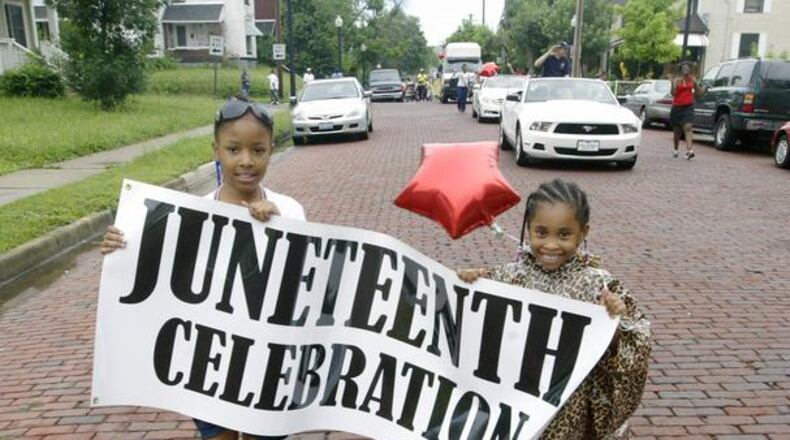Nobles and Freemen, your destinies call you
Onward to honor, to glory and fame.
-From “Emancipation” by Paul Laurence Dunbar
We’ve heard a lot about Juneteenth recently, but how much do most people know?
Juneteenth celebrations happen on June 19 and celebrate the day in 1865 that enslaved people in Texas learned about the Emancipation Proclamation and hence their freedom. Lincoln issued the Emancipation Proclamation two-and-a-half years prior on Jan. 1.
>> A first-hand account from Dave Chappelle's celebrity-packed comedy shows
Credit: Submitted
Credit: Submitted
Juneteenth has mostly been a local Texas holiday that has spread out into celebration in dozens of states as the day slavery was "finally" over in the United States. But even after Juneteenth, there were hundreds of slaves still enslaved throughout the United States. There was no real absolute ending to chattel slavery in the United States until the 13th Amendment, which abolished slavery and involuntary servitude (except for those convicted of crimes), was ratified in December 1865.
Credit: DaytonDailyNews
Even so, Juneteenth has still remained a symbolic day to celebrate when the last remaining enslaved people were finally freed. Though Juneteenth has received much of the attention, it is important to note that historically in the United States Emancipation Day has been celebrated on many different days depending on local significance.
>> Here is why 300 black men in suits marched downtown
Credit: Chris Stewart
Credit: Chris Stewart
Even before the Civil War, African Americans celebrated Emancipation. Most African Americans in the North were freed during processes of gradual emancipation after the American Revolution. Some in the North adopted Aug. 1 as their Emancipation Day, which was the date in 1834 when slavery was abolished in the British West Indies. New York State celebrated Emancipation Day on July 4, which was the date slavery was finally abolished in the state in 1827. In Washington, D.C., Emancipation Day is celebrated April 16, which is the date in 1862 that enslaved people were freed in the capital. In South Carolina, where I am from, we celebrate Emancipation Day on Jan. 1, commemorating the signing of the Emancipation Proclamation which freed slaves in Confederate states. In fact, Black Civil War soldiers celebrated the proclamation the very night it went into effect in South Carolina with orations and music.
Here in Ohio, Emancipation Day has traditionally been celebrated on Sept. 22.
>> Letter from former slave living in Dayton hits the web
Credit: Chris Stewart
Credit: Chris Stewart
In 2006, an Ohio high school teacher Paul LaRue worked with his students to ensure that Emancipation Day in Ohio be named a state holiday. The bill was signed into law by Gov. Bob Taft in June 2006. Sept. 22 was the date in 1862 when President Lincoln revealed the first version of the Emancipation Proclamation. Across the nation African Americans gathered in public to hear the Proclamation read. African Americans celebrated the day for decades. In 1890, 18-year-old Dayton native Paul Laurence Dunbar wrote the poem "Emancipation" in honor of Emancipation Day. The archives of local Black Newspaper The Dayton Forum, has several decades of vibrant Emancipation Day advertisements and articles. On Sept. 18, 1942 The Dayton Forum turned attention to how the historical legacy of Emancipation could be honored 80 years later. In a snippet titled "If Abraham Lincoln Were Alive Today" they warned that "President Roosevelt and Congress, should remember the words spoken by the Great Emancipator, during the dark days of the Civil War. America, if it would win a complete victory must rid itself of racial prejudice and colorphobia."
>> George Floyd killing sparks 'courageous,’ often intense conversation about race and police in Dayton
Emancipation Day was a time to draw links between past and present struggles against racism and a call to action to fulfill the meanings behind emancipation. Whether celebrating Juneteenth or the several other Emancipation Days throughout the nation, honoring the spirit of Emancipation Day celebrations is important. The Days were celebrations, literally, with dancing, music, picnics, church meetings, etc.
But they were also highly charged political and cultural events for African Americans to take stock of current racial relations, call for an end to segregation, discrimination and racial violence.
In other words, Emancipation Days were days to take account of how far the nation had or had not come since emancipation. Honoring those days meant not just a single one-off holiday, or a vacation day, but a sustained commitment to racial justice. The tradition is part of a push to further the goals of emancipation and freedom and a recognition that achieving freedom for African Americans is a continuing project, not limited to a single day.
Ashleigh Lawrence-Sanders is an assistant professor of history at the University of Dayton.
About the Author



